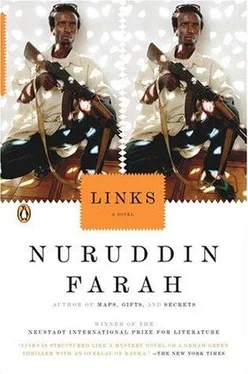“Any idea where she’s buried?”
“None whatsoever.”
“During the last few years,” the driver said, “a lot of terrible things have been done both to the memory of the living and to the spirit of the dead. I’m glad you’ve come on a visit to ennoble her memory, and honor it. Even though, if I permit myself to be cynical for a moment, your mother was fortunate to die when she did. This way she was spared many of the horrors of the civil war.”
“How will you find her grave?” asked the Major.
“I am pinning my hopes on my mother’s housekeeper and caretaker, who will most probably know where she is buried,” Jeebleh said. But, he revealed, he had no idea how to find the housekeeper, who was actually in his employ, in that he paid her salary in the form of monthly remittances from America, directly into her account in Mogadiscio. Jeebleh was sure the housekeeper held the key to many secrets, and he was eager to talk with her.
“Don’t you have any blood relations in the city who might know?” the Major asked.
Although he was tempted, Jeebleh chose not to talk about his motive to visit, or admit that he was hoping he might be able to locate his mother’s story in the context of the bigger national narrative. So he kept it simple: “There are no surviving relations that I know of, or that I’m in touch with. But I have a couple of friends I plan to look up, and I’m pretty sure they’ll help in leading me to where my mother is buried.”
“How odd!” The Major sounded shocked.
“What?”
“I cannot believe that you have friends in the city, but no surviving blood relations.” He repeated the word “friends,” pronouncing it with a mocking distaste. “This is what America does to you.”
“What’s America done to me?”
“It’s made you forget who you are.”
“No, it hasn’t.”
“You’ll see for yourself when you’ve been here for a couple of days that there are no longer ‘friends’ you can trust, anywhere in this country,” the Major asserted. “Here we don’t think of ‘friends’ anymore. We rely on our clansmen, on those sharing our ancestral blood.”
“I find it hard to believe that you don’t have friends,” Jeebleh said.
“Only a fool not in touch with the realities of this country and our current history would insist on placing ‘friends’ above the station occupied by blood relations.”
The driver shook his head. “I don’t agree with you, my dear cousin,” he said. “You and I know that even in the worst times of the civil war, many of us have been saved, given shelter, and then helped to safety by our friends.”
“This is no longer the case, and you know it!” the Major replied. “Let’s not kid ourselves with these and other lies. Nor is it that this fellow doesn’t have any surviving blood relations here — he has plenty of them. Only he chooses to have nothing to do with them, believing they’ll relieve him of his American money, which he doesn’t wish to share with them. He thinks our reliance on blood kinship is backward and primitive. He is saying that he has money, that his family is safe and in America, that he belongs to the twenty-first century, while we belong to the thirteenth. Can’t you see what he’s saying?”
The driver said, “No, I can’t.”
“He’s saying that we’re backward fools, because we think of our kinsmen. Listen to him. He’s here not to visit the country or some relations, but to call at his mother’s grave. And on his way to her tomb, he’ll make the time to look up a couple of his old friends. He’s a modern man. We’re primitive, we have our heads in the sand.”
The militiaman with the cast said, “I think he should go to the south of the city, where they’re all crazy, to look for his mother’s grave. I agree with the Major, there’s something wrong with this man!”
The driver winced like a parent in whose presence a child has been rude to a guest.
The Major now launched into a new tirade on how people like Jeebleh were on show-off visits “as false as their teeth.” He devoted a few enraged remarks to their mannerisms, their clothes, their shoulder bags, the Samsonites-on-wheels in which they carried steam irons with which to press their stonewashed jeans. “The man is here to be gawked at,” he said. “You can bet he left America after paying a visit to his dentist, who scoured his mouth for possible repairs, and after calling on his physician, who prescribed his tablets against malaria. A tangle of pretenses, that’s what he is!”
He paused for a moment, but he wasn’t done with Jeebleh. He turned to the driver and said, “Ask him who his friends are, since he has no blood relations in the land. Ask him.”
Jeebleh was silent, but the driver answered the Major: “I suggest you lay off!”
Midway through the last rant, Jeebleh had decided not to rise to the Major’s provocation, because he felt apprehensive. It worried him that he thought of the Major as someone behaving like a damaged person who placed his own inherent failures at the center of his self-censure, and who laid all blame at someone else’s door. But he knew this notion wasn’t right, and he didn’t like the fact he was thinking it. Instead, Jeebleh eavesdropped on the conversation coming from behind him and was shocked to hear so much hate pouring forth from the militiamen, directed at StrongmanSouth and his tattered army that had laid their region to waste. Jeebleh looked for a long time at the wounded youth, with as much pained empathy as he could muster.
The driver jumped into the opportunity the silence had afforded him to change the subject, telling Jeebleh, “Our young warrior in the back stepped on an antipersonnel mine buried by StrongmanSouth’s militiamen in a corridor of the territory we control. In the opinion of the surgeon in Nairobi, he was lucky to get away with injuries only to his leg — he could’ve been blown sky high.”
It grieved Jeebleh to note that many of the militiamen laying down their lives in the service of the madness raging all around were mere children. It pained him too that those in the vehicle with him were so full of adult-inspired venom, their every third word alluding to vengeance, to death, and to shedding more enemy blood. They had lost their way between the stations of childhood and manhood. To judge from their conversation, many of them preferred dying in the full glory and companionship of their kin to being alive, lonely and miserable. Jeebleh remembered what Oscar Wilde said: that simply because someone is willing to die for a cause doesn’t make the cause just.
The Major said, “What do you, in America, think of us?”
It dawned on Jeebleh that there was something doglike about the Major: his tongue in a mouth forever ajar, throbbing with deadly menace. But after studying it for a few moments, he decided that the tongue hung out not like a dog’s, but like laundry left on the line to dry.
“It’s very hard to judge from there. I’ve come here to learn and to listen,” Jeebleh said.
“Then there’s hope for us yet!”
“In some ways, I admit things were a lot clearer when I was last here, in the days of the dictatorship. But despite everything, and despite the prevailing obfuscation, I’ve come to assess the extent of my culpability as a Somali.”
And he imagined seeing corpses buried in haste by his kinsmen, the palms of the victims waving as though in supplication. Similar images had come to him, several times, in the comfort of his home, in New York, and on one occasion, in Central Park, he had been so disturbed that he had mistaken the stump of a tree for a man buried alive, half his body in, the other half out. This was soon after he had watched on television the corpse of an American Ranger being dragged through the dusty streets of Mogadiscio. Those images had given him cold fevers for months. Now he felt the strange sensation of a many-pronged invasion, as if his nightmares were calling on him afresh. His throat smarted, as with an attack of flu coming on.
Читать дальше












